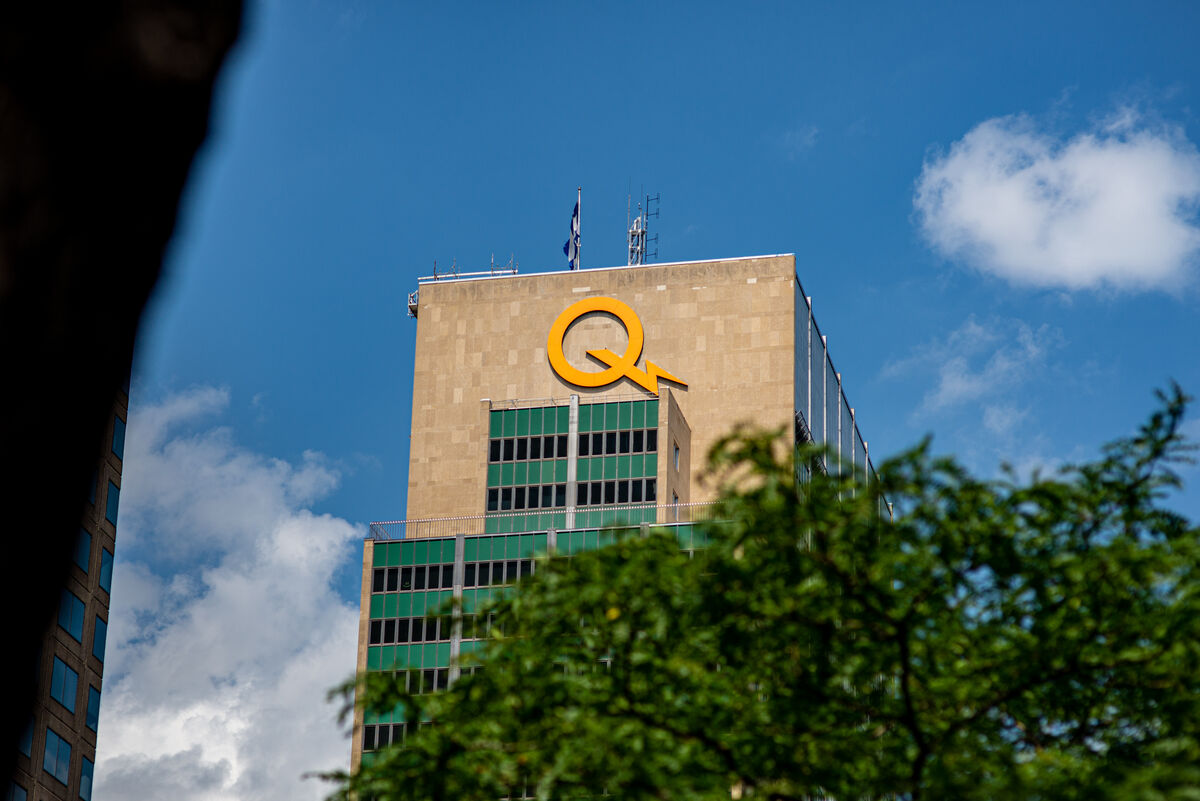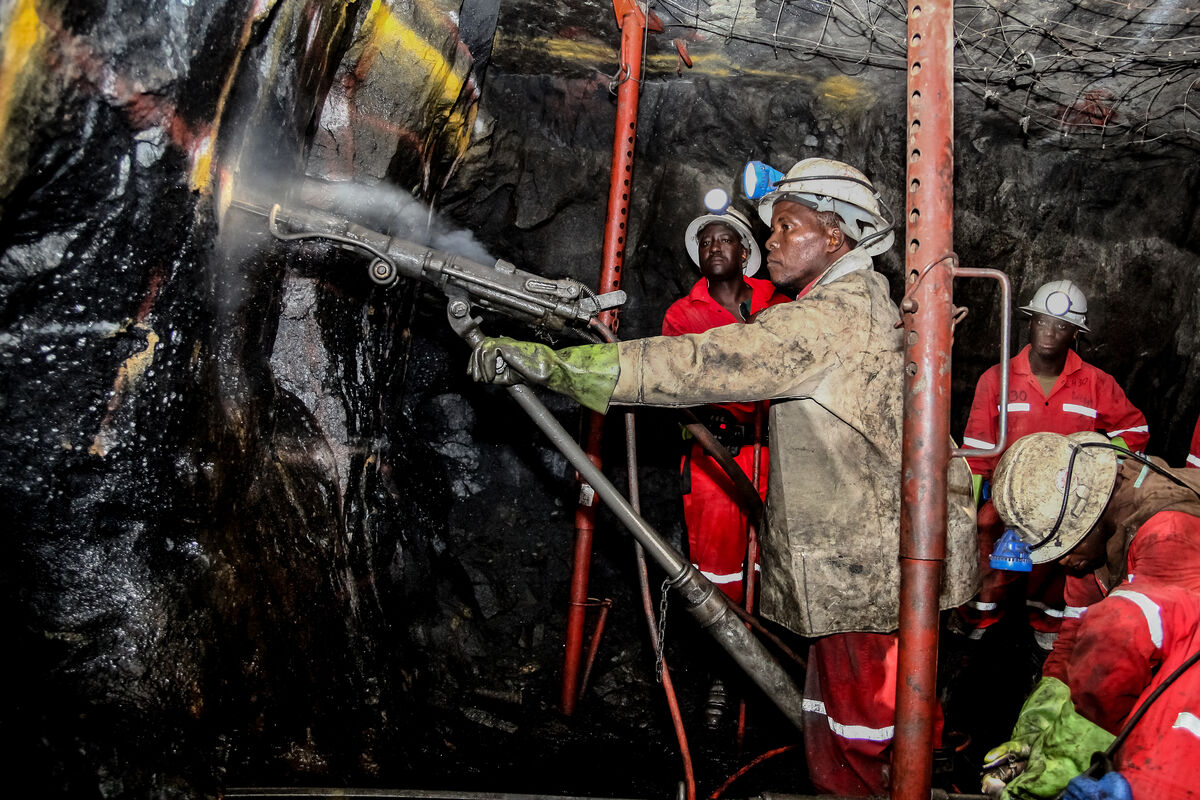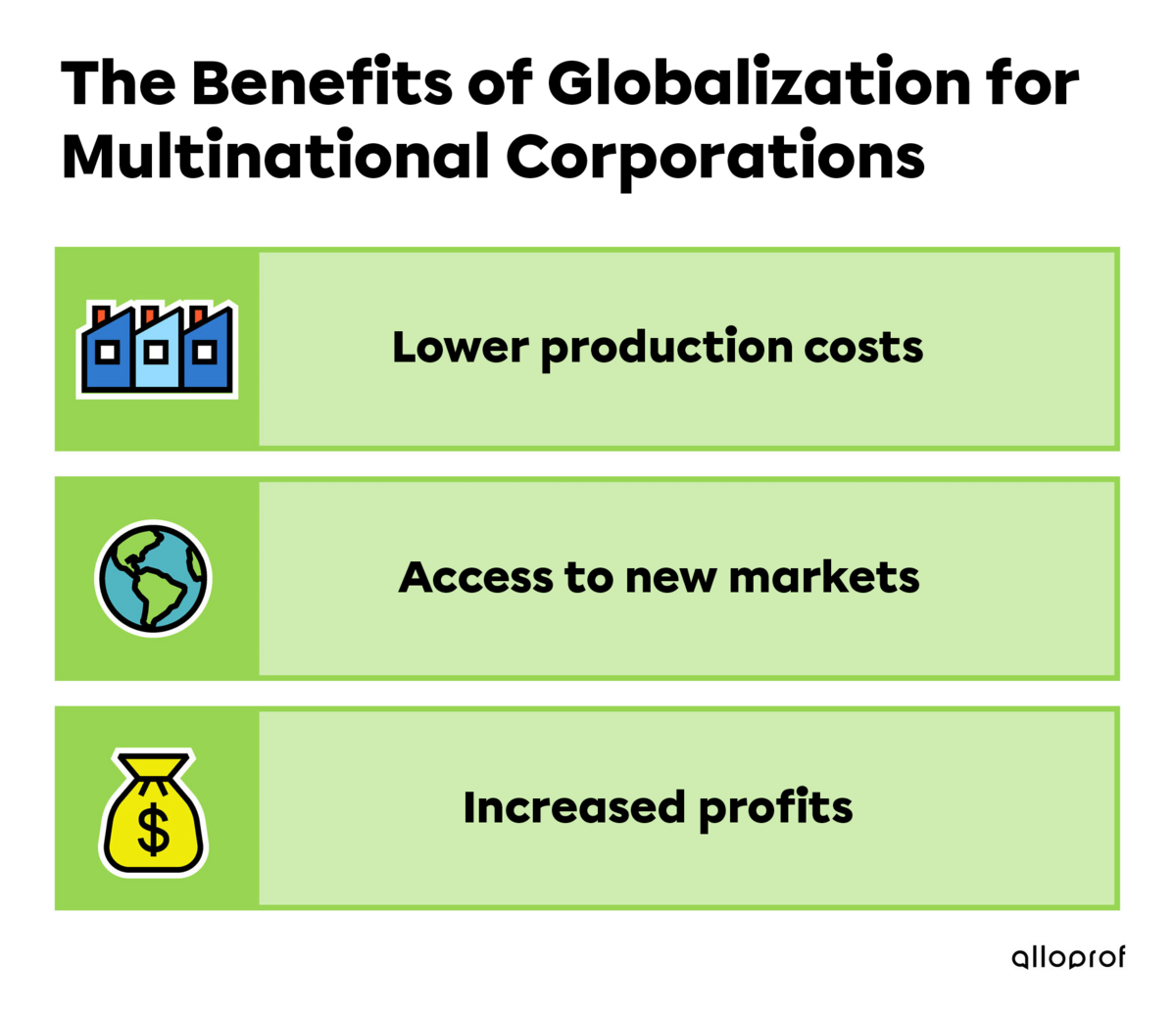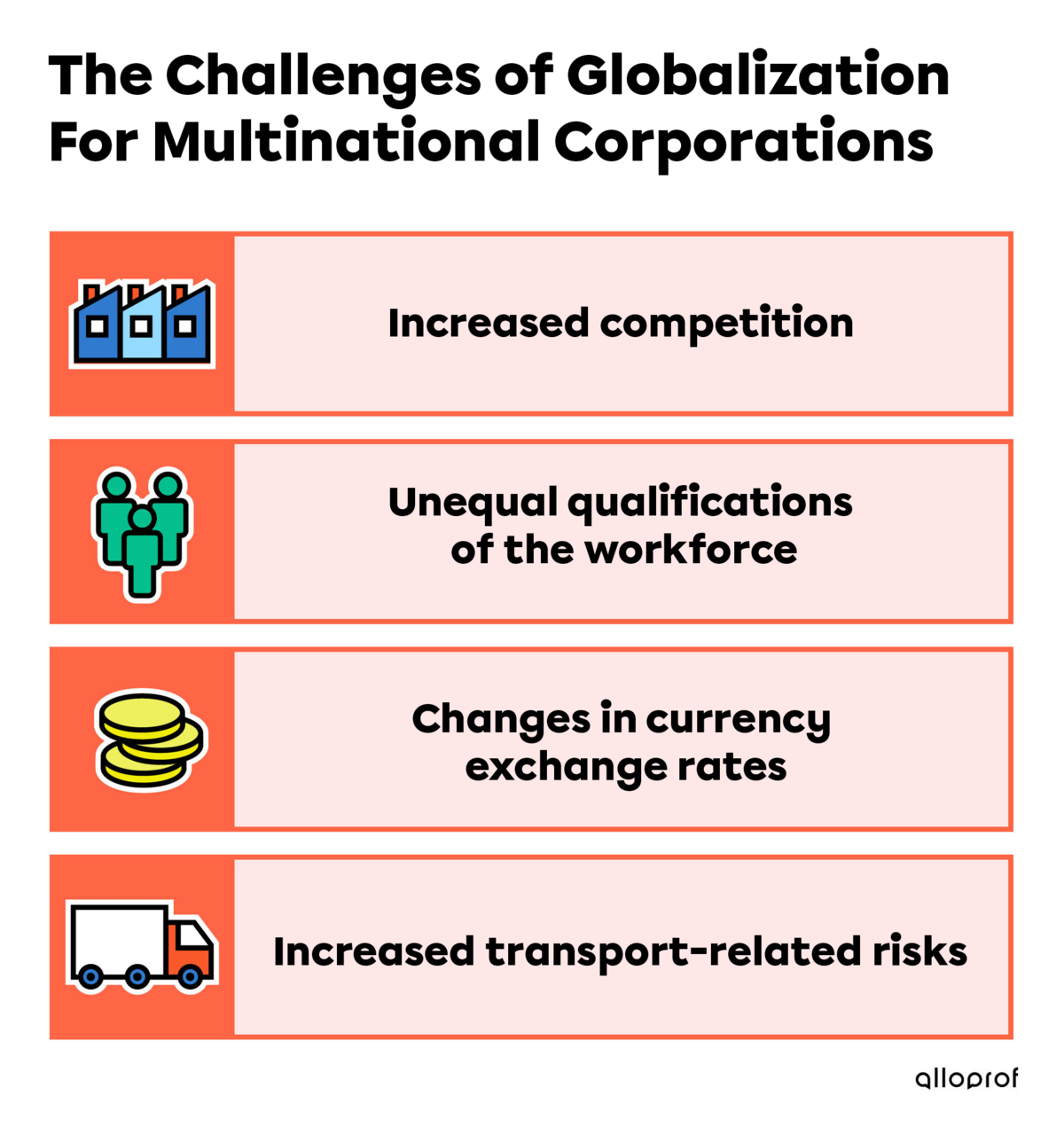The economic agreements signed between states promote free trade. Free trade opens up global markets and provides many benefits for large multinational corporations and the most powerful states. Worldwide, states like the idea of multinationals relocating to their territory. These companies provide them with an additional source of income through the taxes they have to pay and create jobs, which reduces the unemployment rate.
-
Free trade is an economic policy that seeks to eliminate all trade barriers between states that have signed an agreement.
-
The market is a place of exchange where commercial activities take place. This is a meeting place for sellers (supply) who have a good or a service to sell and buyers (demand) who want to pay money for a product. There are regional (Quebec), national (Canada), continental (North America) and international (global) markets.
-
A multinational corporation is a company that carries out activities in countries other than its country of origin (exploitation of resources, production of goods or services, research and development, etc.).
Multinationals can set up anywhere they want. They look for countries that offer the most advantageous government measures for increasing their profits. Therefore, states implement specific measures to attract multinational corporations.
- Countries can offer tax advantages to companies, which creates competition between countries that want to attract these companies.
In 2017, the United States adopted a tax reform that was very beneficial for companies. The tax rate on profits was lowered from 35% to 21% for US-based multinationals. This tax advantage encouraged companies to move there. Also in 2017, China’s tax rate was 25%. To be competitive, China decided to offer companies a tax exemption on profits, but under certain conditions. So it ended up being more advantageous for a company to set up in China instead of the United States.
- Governments can provide subsidies (financial assistance) to companies to invest in research and development.
For example, the Canadian government provides $3 billion in subsidies, which is distributed to all companies based in Canada that conduct research and development.
- Multinational corporations can also be given a preferential tariff on resources essential to their production, such as electricity.
In Quebec, Hydro-Québec offers Rate “L” to encourage large industrial companies in Quebec to invest in their facilities. If a company invests in Quebec, it receives a refund of up to 50% of its electricity bill. For example, the mining company ArcelorMittal is currently considering investing $500 million over four years in its North Shore facilities. The company could then receive an electricity discount of at least $15 million per year.

From 2017 to 2019, Hydro-Québec’s Rate “L” provided business with $234 million in electricity rebates. It is projected that by March 2028, businesses will have received $2 billion in rebates.
Source: Daniel_Gauthier, Shutterstock.com
Finally, governments can contribute to the development of infrastructures (facilities) to make it easier for multinationals to operate in their country. Roads, ports, railroads and even airports can be built to facilitate the transportation of goods. For example, a road connecting a mine to a town can transport both goods and workers.
Countries offer tax benefits, subsidies, preferential tariffs and infrastructure development for one reason: to attract multinationals to their territory.
Countries benefit considerably from multinationals moving to their territory. What are the benefits for multinationals?
The main goal of multinational corporations is to make a profit. Multinationals may do business in several different activity sectors and are always looking for countries with favourable government policies.
-
The term activity refers to all human actions and operations carried out by a company or state to achieve a goal.
-
Outsourcing refers to the relocation of part or all of a company’s activities to another country in order to reduce production costs. Relocation generally occurs from developed countries towards developing or emerging countries.
For example, clothing production has several different stages. First, the cotton is grown and woven (textile), then the garment is designed and the fabric is sewn together, and an advertising campaign is created, etc.
When a company decides to offer cellphone services, it has to multiply its activities to make its project successful. Its activities consist of selling the service at one or more points of service, advertising, customer service, billing, etc. The multinational decides where it would be most advantageous to carry out its activities. But what is the incentive for companies to move their activities? There are 4 main reasons:
Cheaper Production Costs
Production costs are lower in developing countries. Production costs include expenses related to exploiting resources and manufacturing goods. These two activities require a lot of workers. The cost of labour varies according to location.
The base salary for a miner in South Africa was $530/month in 2013, while Canadian miners were paid a minimum wage of $3,440/month in 2015.
To reduce production costs, companies choose to do business in countries where workers have low salaries.

South African miners extract chromium and platinum, which are then exported around the world.
Source: Sunshine Seeds, Shutterstock.com
Working conditions in many developing countries are not as regulated as conditions in developed countries and companies take advantage of this. This is why labour-intensive activities are often outsourced. The companies’ executives and creators tend to remain in their home countries. This explains why Apple products bear the following phrase: Designed by Apple in California. Assembled in China. More than just electronic goods are assembled in Asia. Just look at the label on your clothes and you will find that most of them were also made in Asia.
Access to New Markets
Outsourcing is also attractive to multinationals because it gives them access to new markets. Open borders made possible by international agreements grant companies access to new markets outside their home country. They can reach new consumers and increase their sales of products or services. When a factory or a manufacturing plant is set up in a developing country, it creates jobs in the region. These new workers then have a salary, so they become consumers who can buy the products that the multinationals sell. This is how new markets are created.
It is similar to a band performing a concert. At some point, most people in a certain area have seen the show. So the band travels to another province or country to find new people to attend the concert. This expands the market of potential spectators so the band can perform more shows and make more money.
Lower production costs and access to new markets increase company profits.
Avoid Protectionist Measures
Outsourcing allows multinationals to get around the protectionist measures of certain countries. Some countries impose stricter protectionist measures than others. For example, they encourage exports and limit imports of foreign goods. To get around these protectionist measures, multinational corporations move some of their activities, such as production plants, to these countries. As a result, they are no longer considered “foreign,” so they avoid protectionist measures. This makes it much easier for them to sell their products in countries with protectionist measures.
Protectionism is an economic policy that opposes free trade and seeks to protect a state’s economy from competition with other countries. This protection is implemented through measures that reduce imports, such as taxes or tariffs (customs duties).
Avoiding Compliance With Strict Environmental Standards
As mentioned above, countries implement measures that attract multinationals. In addition to the economic measures such as lower taxes, subsidies and preferential tariffs, multinationals are most interested in the various standards set by certain countries. Environmental standards in developing countries are less strict than in developed countries. As a result, companies can take shortcuts to reduce production costs, such as not treating wastewater that contains chemicals before discharging it into waterways. In developed countries, the facilities used to carry out this kind of treatment are expensive, which would reduce the profits of multinationals.

Globalization also presents challenges for companies. For example, if a company can access new markets to sell its products, this means that other companies can also enter this market. This creates more competition between companies around the world as they enter markets in each other’s countries. In addition, since companies carry out activities all over the world, they face more risks related to transporting goods from one country to another (by ship, train or plane) or to variations in the rate of currency exchange. Another factor that companies take into consideration is workforce qualifications, which vary between regions.

As markets open up around the world, states become more interdependent. This means that a single decision can affect several economies around the world. This is one of the downsides of globalization. Nevertheless, states and multinationals primarily benefit from globalization.
States benefit from multinationals in their territory, so they implement measures to attract them. They help states increase their revenues and create jobs, although the workers’ conditions are sometimes very poor.
Multinationals have many countries to choose from where they can outsource their activities to increase profits.
To find out more about globalization, see the concept sheet on the influence of globalization.
This concept sheet refers to multinational corporations operating mainly in the textile (fabric) industry, but this is not the only industry in which these companies operate. Other industries include:
-
aerospace (Boeing, Bombardier)
-
apparel (Nike, Adidas)
-
food (Nestlé, PepsiCo)
-
distribution (Walmart, Couche-Tard)
-
entertainment (Walt Disney Company, Sony)
-
energy (Royal Dutch Shell, Chevron)
-
finance (Prudential, Bank of America)
-
electronics (Samsung, Apple)
-
automotive (Volkswagen, Toyota)
Klein, Juan-Luis and Frédéric Lasserre. Le monde dans tous ses États, 2016, p.60, 63, 66 and 67.